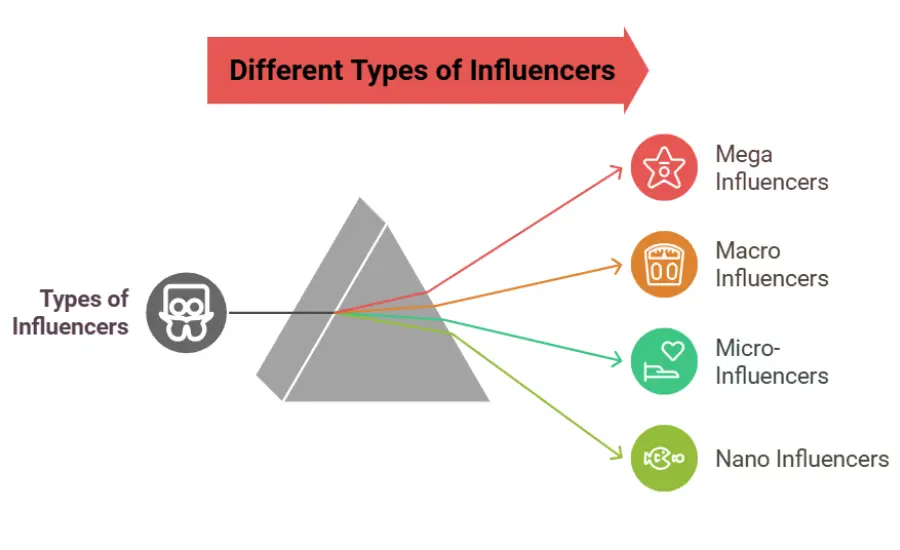In the past decade, Influencer marketing has emerged as one of the most successful models for promoting your brand online. Businesses have benefited a lot from this Social Media Marketing phenomenon. As you can see, currently, influencers are ruling the social media platforms with their unique content and millions of followers. Today, in this blog, we’ll discuss influencer marketing strategies and understand how to leverage influencer marketing effectively, the different approaches to it, and look at some successful case studies.
What is Influencer Marketing?
Before we discuss influencer marketing strategies we need to understand what influencer marketing is. Celebrities dominated earlier social media platforms. However, once social media evolved, it gave a chance to everyday individuals to become famous and influential. This is how influencer marketing came into being. Influencer marketing refers to promoting your brand or product through individuals with substantial social media followings. Furthermore, these influencers are famous for creating niche, relatable content for everyday audiences. This makes it easy for brands to reach specific demographics.
Understanding Different Types of Influencers – Influencer Marketing Strategies
When it comes to social media, we can find four different types of influencers. Every category brings its own set of pros and cons with it, so let’s have a look.

Mega Influencers
Influencers with over 1 million followers fall in the mega Influencers category. They mainly include celebrities, athletes, or media personalities. They can engage a large number of audiences at a single time. However, as the audience base is broad, the engagement rate is low for the mostly irrelevant crowd. This class of influencers is suitable for brands with high budgets aiming for mass reach and promotion rather than conversion.
Macro Influencers
Influencers with 500K-1M followers fall in the macro category. They keep a good balance between reach and niche expertise. For brands looking for conversion and niche-specific marketing, these influencers are a great choice. Moreover, macro influencers are ideal for startups and growing firms looking for a large audience while maintaining relevance to the viewer.
Micro-Influencers
Micro-influencers are famous for their high engagement rates and affordability. They have 10k to 100k followers and maintain a personal connection with their audience. Businesses aiming to target specific demographics can hire the services of Micro-Influencers.
Nano Influencers
Also known as baby influencers, they have followers between 1k-10k. They are still in the initial phase of their growth. They interact closely with their followers, resulting in high engagement. Local businesses can get a lot of business from marketing through them.
Suggested Read:
Crafting Your Influencer Marketing Strategy
Below, we’ll discuss how you can create a perfect influencer marketing campaign which will ensure a good ROI and conversion. So here are some of the best influencer marketing strategies that you can follow to enhance your social media presence.
Define Your Campaign Goals
You’ll need to start by properly specifying your goals. You need to decide whether you want to increase brand awareness or drive sales. By specifying your KPIs, you’ll have a clear understanding of which type of influencer you’ll need.
Setting Up a Budget
Once you have decided what you want, you need to decide how much you can spend on it. Prepare your marketing budget after thoroughly researching the industry standards. Moreover, make sure to consider the fees of the influencer you want to hire when deciding the budget.
Identifying the Right Influencers
Now, from the pool of available influencers, pick one that resonates best with your brand. Consider their values, reputation, and content style. Furthermore, use tools to check out their engagement metrics so that you can get a somewhat real picture of it.
Initial Outreach and Collaboration
Initial outreach and communication have a great impact on the influencer relationship as they show the value and depth of the brand. Furthermore, you should focus on building a strong relationship with them from the start for long-term partnerships. Provide detailed briefs and respect the influencer’s creative freedom.
Executing the Campaign
Once you have communicated your needs to the influencer, it’s time to execute the campaign.
Content Creation and Collaboration
Collaborate with influencers and create content that aligns with your brand values and policies. Furthermore, you can utilise various platforms such as videos, podcasts, and blog posts to reach different audience segments.
Promotional Techniques
You can also use various promotional techniques to boost the marketing campaign, such as contests, giveaways, and exclusive discount codes. This will lead to immediate conversion and enhanced reach.
Leveraging Influencer Content for Paid Ads
Content produced by influencers can also be utilised as advertisements. This content can be used in your paid campaign to capitalise on the influencer’s popularity and the trust of their followers.
Measuring and Analysing Success
Key Metrics to Track
Use various tools provided by social media platforms and other analytics services to measure the success of your campaign. Also, track metrics such as engagement rates, reach, conversions, brand mentions, and hashtag usage.
Iterating Based on Performance
Based on the metrics received, figure out what works and what does not, and adjust your strategies for future campaigns based on this information.
Trends and Best Practices in Influencer Marketing
Current Trends
While planning the ad campaign, it is important to consider what is trending right now. You should look out for trending songs, hashtags, or events that you can incorporate into your content to make it go viral. Furthermore, rather than solely focusing on mega influencers, you should also look out for up-and-coming micro and nano influencers who are trending now.
Ethical Considerations
While preparing your ad campaign, you should ensure transparency and authenticity. Furthermore, comply with advertising regulations and avoid content that can hurt the sentiments of people.
Real-World Case Studies: Businesses Who Succeeded Using Influencer Marketing
Case Study 1: HelloFresh
HelloFresh is a meal kit delivery start-up that successfully enhanced its popularity and reach by leveraging influencer marketing. The brand partnered with various food bloggers, YouTubers, and content creators to showcase its products in a relatable manner. This resulted in instant popularity and increased revenue tenfold.
Case Study 2: Nike
Nike has been utilising influencer marketing to their advantage for a long time now. It has helped the brand maintain its presence by partnering with athletes and fitness influencers regularly.
Case Study 3: Daniel Wellington
Daniel Wellington marketed their luxury watches using influencer marketing. The brand sent free watches to influencers, who posted pictures with them using a hashtag. This strategy skyrocketed their brand visibility.
Common Pitfalls to Avoid While Planning Your Influencer Marketing Campaign
Misalignment with Influencers
Ensure your brand aligns with the influencer you choose. Partnering with irrelevant influencers whose audience doesn’t meet your targeted demographics can waste resources.
Lack of Transparency
Ensure that the content complies with advertisement regulations and properly mentions the brand in the content, showcasing its original value.
Inadequate Performance Tracking
Track the performance of your ad campaign to refine future strategies. Metrics are important indicators of success.
Conclusion
Influencer marketing is a powerful tool that can help you increase your brand’s visibility. To execute it to perfection, you’ll need professionals. Creative Nexus can take care of all your Social Media Marketing needs. CNX is a leader in the digital marketing industry and has helped many leading brands around the world realise their marketing goals. So what are you waiting for? Book a one-on-one consultation today.




